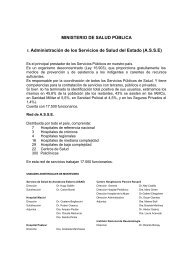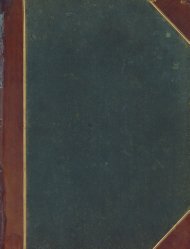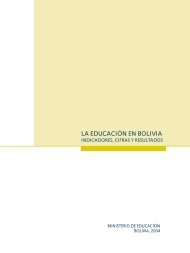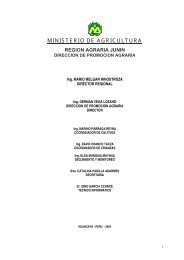Translating Nouzha Fassi Fihri's La Baroudeuse: A Case Study in ...
Translating Nouzha Fassi Fihri's La Baroudeuse: A Case Study in ...
Translating Nouzha Fassi Fihri's La Baroudeuse: A Case Study in ...
You also want an ePaper? Increase the reach of your titles
YUMPU automatically turns print PDFs into web optimized ePapers that Google loves.
Appendix E: Marilyn Booth's e-mail response to the questionnaire<br />
When you were translat<strong>in</strong>g "My Grandmother's Cactus," did you have an<br />
audience <strong>in</strong> m<strong>in</strong>d?<br />
Yes, but vaguely so. At the time, I was liv<strong>in</strong>g <strong>in</strong> England (and then <strong>in</strong> Cairo when<br />
I did the f<strong>in</strong>al edit<strong>in</strong>g/page proofs etc.). I was a bit "spoiled" <strong>in</strong> that the UK<br />
audience is more sophisticated than the US one <strong>in</strong> terms of translated literatures,<br />
so <strong>in</strong> some ways I probably subconsciously took audience for granted, didn't th<strong>in</strong>k<br />
about it as much or as specifically as I might now, depend<strong>in</strong>g on the project. Let<br />
me describe briefly how the Cactus project came about. I was <strong>in</strong> London see<strong>in</strong>g<br />
my friend Zelfa Hourani, at Quartet Books, and she asked if I'd thought about<br />
putt<strong>in</strong>g a short story collection together. I hadn't, but we talked and I got very<br />
enthusiastic. I had a couple of specific motivations: I wanted English speakers to<br />
recognize female Arab writers who were not Nawal el-Saadawi (for whom I have<br />
a lot of respect as an activist--after all, I did translate her prison memoirs! but at<br />
the time, it seemed like she was the only female Arab writer that one saw <strong>in</strong><br />
bookstores). I have to really put myself back <strong>in</strong>to my th<strong>in</strong>k<strong>in</strong>g at that time: it has<br />
been quite a while and I've done a lot of translat<strong>in</strong>g s<strong>in</strong>ce, so I am try<strong>in</strong>g very hard<br />
here to not let later experience shape what I am say<strong>in</strong>g. Anyway, and this is<br />
connected to your next question, I thought first <strong>in</strong> terms of a fairly "conventional"<br />
anthology--that is, a more or less historically organized collection, one story per<br />
author, probably start<strong>in</strong>g with Suhayr Qalamawi (some of whose work I would<br />
still like to translate!), and so forth. However, when I started to read, th<strong>in</strong>gs<br />
changed. I'll put hat off until your "audience question" below where it more<br />
properly belongs. Anyway, so this idea that was genu<strong>in</strong>ely mutual, formulated<br />
with Zelfa, had beh<strong>in</strong>d it a vague sense of audience, but I had a lot to learn!<br />
If so, what <strong>in</strong>dividuals might you list as belong<strong>in</strong>g to this audience? (yourself? the<br />
author? your publisher? a professor you had? classmates <strong>in</strong> one of your courses?<br />
professional readers? non-professional readers?).<br />
Def<strong>in</strong>itely, at the time, nonprofessional readers. I felt (and feel) strongly about the<br />
political responsibility of translators--or at least of me as a translator--<strong>in</strong> try<strong>in</strong>g to<br />
complicate a nonacademic (as well as academic) audience's understand<strong>in</strong>gs of<br />
and/or reactions to Arab and Muslim-majority societies and histories and to what<br />
is go<strong>in</strong>g on now culturally <strong>in</strong> terms of contemporary Arabic literature. S<strong>in</strong>ce, at<br />
the time, I wasn't teach<strong>in</strong>g and really wasn't even th<strong>in</strong>k<strong>in</strong>g much about teach<strong>in</strong>g,<br />
an audience of students was not foremost <strong>in</strong> my m<strong>in</strong>d. But <strong>in</strong>evitably, I'm my own<br />
first audience. That is, I have learned the hard way (about a year after I f<strong>in</strong>ished<br />
Cactus) that I should not translate someth<strong>in</strong>g I don't like--it is excruciat<strong>in</strong>g. And<br />
be<strong>in</strong>g my own first audience is certa<strong>in</strong>ly pert<strong>in</strong>ent to the way Cactus evolved.<br />
Here, I take up the story I started <strong>in</strong> the previous answer. When I began to read<br />
stories (before this, what I had read by Egyptian women was mostly novels), and<br />
to collect more <strong>in</strong> Cairo once I was there, I started to feel a bit panicked. I<br />
recognized the historical importance and "emplotment" of women's stories from<br />
the 1930s on, but did not feel that my audience--however vaguely imag<strong>in</strong>ed--<br />
266
















